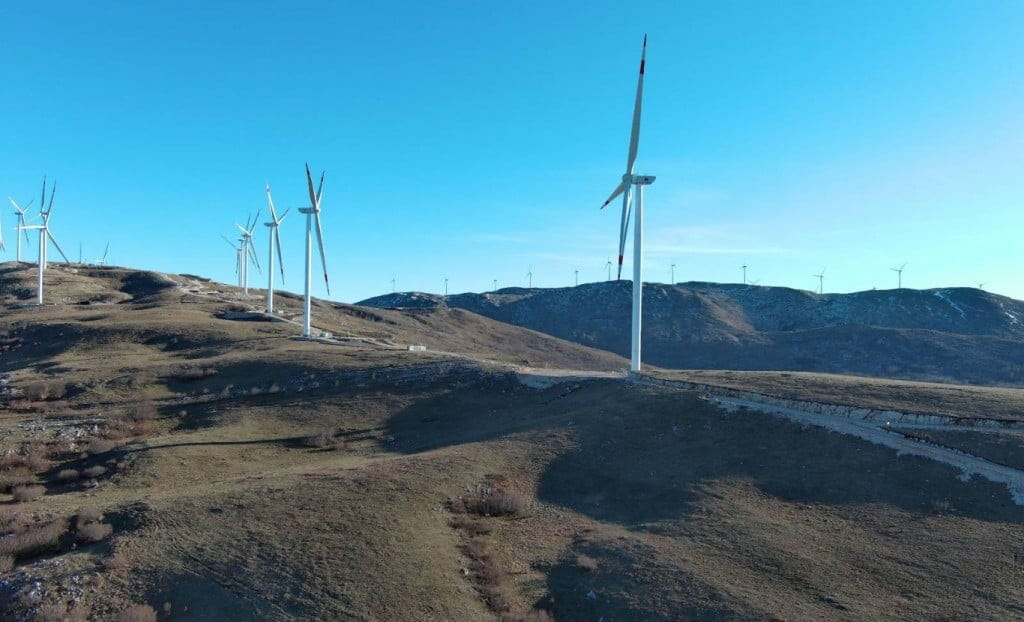Photo: Hercegovina.info
Bosnia and Herzegovina has created an environment of minimal financial burden for companies with foreign capital investing in renewable energy sources through minimal concession fees and network fees. Conversely, state-owned electric utility companies bear the weight of millions in compensation from lost arbitrations, investing substantial financial resources into revitalizing outdated systems. The lack of a strategy and persistent delays in energy industry development will inevitably lead to increased electricity bills for citizens.
Bosnia and Herzegovina (BiH) recently experienced a blackout, affecting the power supply not only in BiH but also in parts of Montenegro, Albania, Croatia, and North Macedonia. The Independent System Operators of BiH indicated that the issue originated from Albania’s power transmission network due to a failure in the interconnection line of 400 kV Zemlak (Albania) – Kardia (Greece), resulting in blackouts in BiH and coastal areas of Croatia.
However, despite the problem originating outside BiH’s borders, many experts have begun to highlight the obsolescence of BiH’s electricity power system and the fact that we have permanent connections to an outdated network. The experts have warned that consequences of uneven investment in the network and allowance of new connections can be expected in the future.
New facilities in the domain of renewable energy sources have already begun to connect to the existing outdated network. However, what is specific to renewable energy facilities is that they are predominantly investments by foreign investors. In our case so far, these investors have been Chinese, Hungarian, and Norwegian companies, which have entered this profitable market by acquiring concessions.
Almir Muhamedbegović, an energy engineer and energy analyst, explains that the term “energy colonization” refers to the devastating consequences of what could be seen as a potentially criminal process of granting concessions for the construction of large solar and wind power plants.
“My view is that large private investments are not as wonderful as the media portrays them. Currently, the most glaring example of these “practices” is in Herzegovina-Neretva Canton concerning large solar power plants, where the government uses legal measures to favor big investors at the expense of local communities”, explained Muhamedbegović.
Almir Muhamedbegović, foto: Emina Muhamedbegović
He emphasizes that he is not enthusiastic about the narratives surrounding large foreign investors in renewable energy sources, as these companies are here primarily for their own interests, not to enhance the energy security of our country.
“If incentives are not provided, and don’t forget that it is money taken from the citizens aimed at promoting renewable energy sources (RES), these companies are likely to export the electricity generated in Bosnia and Herzegovina through guaranteed purchase contracts. This approach effectively results in a form of energy colonization of our resources, particularly wind and solar energy. The electricity produced will not contribute to the public supply at favorable rates for citizens; instead, it will be sold where profits are maximized. Consequently, valuable and location-limited resources are effectively given away for criminally low concession fees, without improving the security of energy supply for citizens”, added Muhamedbegović.
The sun under a foreign sky shall not keep you warn
Damir Miljević, an energy analyst, points out that the blackout, which lasted only a few hours, incurred a cost exceeding BAM 30 million. Instead of addressing the problem, officials are conveying a message that we can expect more situations like this in the future.
““It is disastrous for a society when vital socio-technical systems, such as the electric power system, are managed based on political voluntarism, relying on so-called “functional intelligence and knowledge” acquired perhaps upon assuming office, following the approach of “we will handle it easily” and “pass the buck”. Here, political suitability is given sole importance, while professional competence and expertise are disregarded”, explained Miljević.
Damir Miljević, photo: D. Božić
The case in the Herzegovina-Neretva Canton (HNK), mentioned by Muhamedbegović, refers to recent media reports on plans of the Chinese company Norinco International to acquire an 80% stake in Aurora Solar from the Nikolić family from Banja Luka. The Government of the Herzegovina-Neretva Canton granted Aurora Solar a 30-year concession to build a solar power plant with a capacity of up to 125 megawatts worth BAM 200 million.
However, this is not the only investment by Chinese companies in renewable energy facilities. Another significant project involves the “Ivovik” Wind Park, valued at 130 million Euro. It is projected to generate 259 GWh of electricity annually from 20 wind turbines with a total capacity of 84 MW, installed on the Ivovik hill between Livno and Tomislavgrad. This wind park is set to become the largest electricity producer from renewable sources in Bosnia and Herzegovina. The investors in this project include Power Construction Corporation of China(POWERCHINA) and China General Technology (Group) Holding Co., Ltd (GENERTEC).
When it comes to Hungarian investment in renewable energy facilities, the Electric utility company of the Republika Srpska facilitated the acquisition by Lugos Renewables (LREN) of 70% ownership in the public company “Solarna elektrana Trebinje 1” (Solar power plant Trebinje 1).
Under this contract, the investor secured a concession to build a solar power plant without public bidding, under undisclosed conditions that Elektropivreda RS refused to disclose, despite demands from Transparency International BiH.
We would like to remind you that GP Toming, owned by MiroTomas, a former wartime commander of the Croatian Defense Council (HVO) and member of Hvidra, has utilized the renewable energy incentives system a very long time ago. PortalTačno.net previously reported on the institutional chaos within the Operator for Renewable Sources and Efficient Cogeneration. The company GP Toming will be selling a portion of its renewable energy portfolio to the Norwegian company Greenstat.
(Not) paying the network fee?
It is noteworthy mentioning that the State Electricity Regulatory Commission (SERC), the institution responsible for electricity transmission, international trade of electricity, and the operation of the transmission system, missed the opportunity to set the amount of the network fee for electricity producers utilizing services of Elektroprijenos BiH in 2011 when the tariff methodology was established.
Photo: Hercegovina.info
The network fee for electricity transmission comprises two components. The L component, which accounts for 35% of the power and 65% of the energy paid by electricity consumers, and the G component, which stipulates that electricity producers responsible for “injecting” electricity into the grid pay a fee ranging from 0 to 10%.
Since 2011, SERC, as the competent institution overseeing Elektroprijenos BiH, has issued four decisions regarding the tariff methodology to be used for charging electricity transmission services. However, none of these decisions have included the G component, which is intended to establish a feefor electricity producers.
The impact of not defining the G component is evident in the fact that both private and state electricity producers have been exempted from paying the primary electricity transmission service fees amounting to over BAM 70 million since 2016.
On the other hand, the business operations of the state-owned company Elektroprijenos BiH, responsible for the transmission network system, have been marked by continuous political turmoil regarding the appointment of the company’s leader, as well as unprosecuted affairs concerning award of millions worth tenders.
Regarding planned investments in the network system of Elektroprijenos BiH and their current status, Tačno.net was informed by the State Regulatory Commission for Electricity (SERC) that it approved Elektroprijenos Bosnia and Herzegovina’s Investment Plan for 2024 by a decision from March this year. The total value of the approved investments amounts to approximately BAM 490 million.
“According to the Elektroprijenos BiH report for May 2024, out of the total planned investment value carried over from 2023 amounting to BAM 472.629.176, a total of BAM 46.507.045 has been committed in the current year. Specifically, BAM 16.462.074 is allocated for electrical substations, and BAM 14.524.643 for transmission lines”, explained SERC.
They stated that they have not yet been informed about whether the new investments planned for 2024, totaling BAM 16.362.318, have been realized or contracted, and they attribute this lack of information to the short period of time available.
“A multitude of factors impact the pace of investment realization, alongside intricate public procurement processes. In the past year alone, 23 out of 29 public procurement procedures were canceled due to bids exceeding the planned budget, influenced by inflationary trends, complex global economic conditions, significant price hikes of final products, and disruptions in supply chains. All these factors significantly complicate and delay investments by Elektroprijenos BiH”, explained SERC.
When asked about the current status of implementing the approved Investment Plan for 2024, Elektroprijenos BiH responded succinctly, stating, “The implementation of the approved Investment Plan for 2024 is being conducted transparently in accordance with procedures defined in the regulations on public procurement”. They also noted that the Management Board of Elektroprijenos BiH has adopted the decision approving the Public Procurement Plan for investment projects for the year 2024.
Despite the recent blackout in our country and new connections to the outdated network, it is evident that competent institutions lack an adequate strategic plan to define the electricity policy in Bosnia and Herzegovina.
Muhamedbegović shares a similar opinion, emphasizing the critical importance of developing strategic documents in the energy sector. He argues that without such documents, there can be no defined goals and, consequently, no clear path to achieve them. Muhamedbegović specifically highlights that Bosnia and Herzegovina has not yet adopted its National Energy and Climate Plan – Integrated Energy and Climate Plan (NECAP).
“The draft of that plan was rightfully assessed by the Secretariat of the Energy Community as unambitious and unrealistic. According to this plan, the state aims to “improve” ancient and inefficient thermal power plants and continue their operation. Apart from being technically questionable, the state ignores the impending CO2 taxes effective from January 1, 2026, which loom over our heads. Electricity generated from these old thermal power plants will become even more unprofitable, given that its profitability is already questionable even without these taxes,” added Muhamedbegović.
He also emphasizes that the relevant ministers and the policies they implement declare support for decarbonization and democratization of electricity production. However, when you see a plan like this, it becomes clear that they have no intention of implementing it; instead, they defer it to some undefined future that may never arrive.
Despite everything, the state and competent institutions need to protect the transmission network of BiH. Miljević points out that there is a huge number of requests for connection to both the transmission and distribution networks in BiH, often exceeding the capacities of both networks. Additionally, due to deliberate poor legal regulations, so-called investors receive approval for connections, even though it is evident to everyone that they do not possess the financial resources to realize the investments these connections require.
“So, in practice, we again face a situation where obtained concessions and connections are being offered for sale to serious investors, who are unable to obtain a connection precisely because of intermediaries. Such a situation could be easily resolved with minimal effort, but unfortunately, there is no will to do so because this represents a joint criminal enterprisebetween authorities and these so-called investors, which we have witnessed with small hydroelectric power plants and feed-in tariffs. Notably, neighboring Serbia addressed this issue relatively simply by amending the law, requiring investors to provide a bank guarantee for their investment realization. This measure alone drastically reduced the number of grid connection requests in Serbia from 21.000 MW to 4.000 MW, effectively cutting out intermediaries”, concluded Miljević.
Tačno.net also reached out to Elektroprivreda BiH regarding their intentions to acquire renewable energy facilities, but as of the publication of this text, no response has been received. The future of this company is undoubtedly uncertain, especially considering the reported loss of BAM 331 million in 2023.
Due to the negligent attitude of competent institutions towards this matter and their apparent prioritization of profit, there is a growing concern about the consequences of this inaction on the future operation of Bosnia and Herzegovina’s power system.









